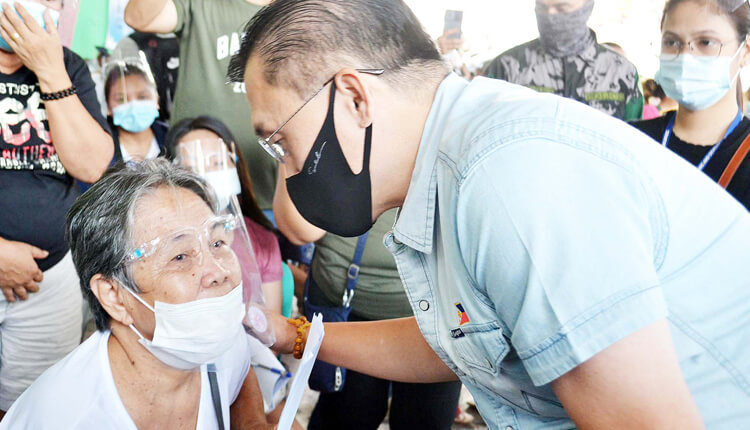SBG seeks more health facilities for poor, ‘better’ social net for elderly
SENATOR Christopher ‘Bong’ Go is pushing for the creation of more ‘specialty’ hospitals and centers, especially in the country’s rural areas.
Go, chair of the Senate Committee on Health, pointed out that many Filipinos with health concerns, especially those in far-flung areas, struggle to receive immediate and adequate medical attention given the need to travel to urbanized cities to visit existing specialty hospitals.
“Saksi ako sa nakakalungkot na sitwasyon ng ating mga kababayang may karamdaman sa tuwing nag-iikot ako sa iba’t ibang parte ng ating bansa upang mamahagi ng tulong sa kanila.
“Batid ko na ang ugat ng problema ay ang kawalan natin ng specialty hospitals, gaya ng Philippine Heart Center, Lung Center of the Philippines, Philippine Children’s Medical Center, at National Kidney and Transplant Institute, sa iba’t ibang panig ng bansa.
Ang mga ospital na ito ay ilan sa pinakamagagaling na ospital sa bansa. Ngunit sa kabila nito, napakalayo ng kanilang mga serbisyo sa karaniwang mga Pilipino lalo na sa mga taga-probinsya,” he stressed.
According to the Department of Health, a specialty hospital is classified as a facility that focuses on a particular disease or condition or on one type of patient.
A specialized hospital is dedicated to treating a particular type of illness requiring a range of treatments or diseases of a particular organ or group of organs.
The senator then reiterated his support for President Ferdinand “Bongbong” Marcos, Jr.’s call to establish more specialty hospitals or centers outside Metro Manila. He added that the creation of these health facilities is one of the optimal solutions to address the gaps in healthcare across the country.
“Specialty hospital o specialty center man, sa pagkakaroon ng dagdag na access ng ating mga kababayan sa mga serbisyo ng mga espesyalista, hindi na mahihirapan ang mga Pilipino kahit nasaan man silang sulok ng bansa dahil mas mapapalapit sa kanila ang mga ito.
“Hindi na nila kailangang lumuwas pa ng Maynila para lamang magpagamot sa puso, baga, o bato. Specialty hospital o specialty center man, ang importante maibaba ang serbisyo ng gobyerno sa tao,” Go continued.
Go added that a strengthened healthcare system could also significantly help in the country’s economic recovery, expressing, “Tandaan natin na nasa yugto tayo ng pag-ahon ng ating ekonomiya—mga nawalang kabuhayan at trabaho—dulot ng pandemya.”
Go has been consistent in pushing for the establishment of more Super Health Centers and Malasakit Centers nationwide, highlighting how these centers have already helped millions of poor and indigent Filipinos.
The Malasakit Centers are one-stop shops where patients can conveniently avail of medical assistance programs offered by the government. Go is the principal author and sponsor of the Malasakit Centers Act. There are now 152 such centers nationwide.
During his visit to Davao City last Friday, October 14, 2022, Go also assured his continued support for the welfare of all elderly citizens.
“Ipaglalaban ko yang (kapakanan ng) mga senior citizens. Alam niyo ba kung bakit? (Kasi) darating tayong lahat sa pagiging senior kaya (sa) mga kabataan, pasalamatan natin ang ating mga senior citizens. Wala tayo sa mundo kung hindi dahil sa kanila,” expressed Go in his speech.
“Kaya mga anak, mga apo, ‘wag ninyong pabayaan ang inyong mga magulang at inyong mga lolo’t lola. Sila ang nagbigay ng buhay (sa inyo) at nagsusumikap (mabigyan kayo ng magandang buhay).
“Kayo po na mga senior citizens ang nagsumikap para sa inyong mga anak. Maraming salamat sa inyong sakripisyo para sa aming lahat,” he continued.
In line with his vow, particularly during these tough times, Senator Go co-authored Republic Act No. 11916, which raises the monthly pension of indigent seniors from P500 to P1,000. The said increase aims to support their basic necessities and medical needs.
At the event, Go and his team also handed out grocery packs, masks, vitamins, shirts, and meals to 1,075 senior citizens.
Meanwhile, the senator also provided cellular phones, watches, bicycles, shoes, and balls for basketball and volleyball to select individuals.



